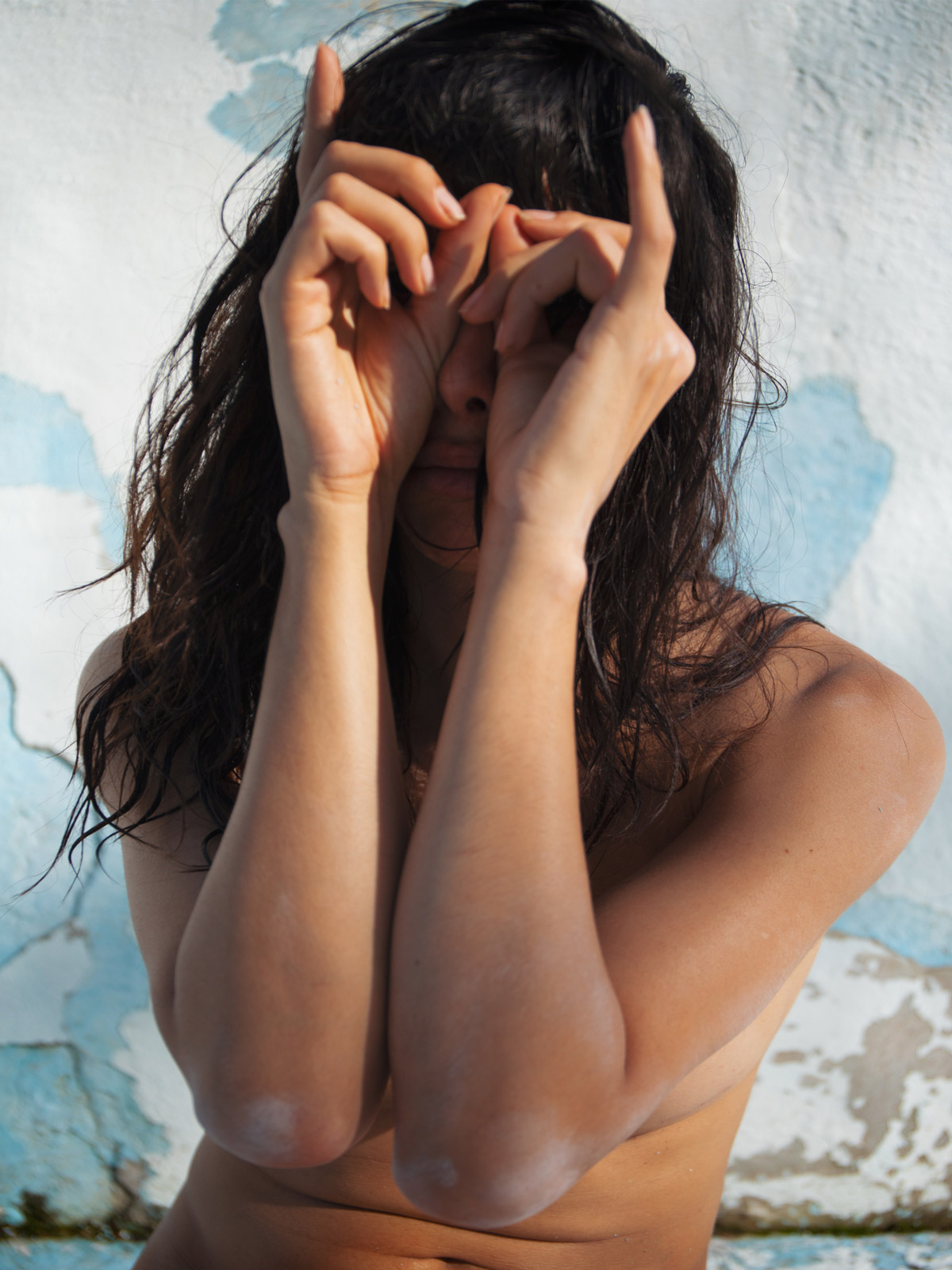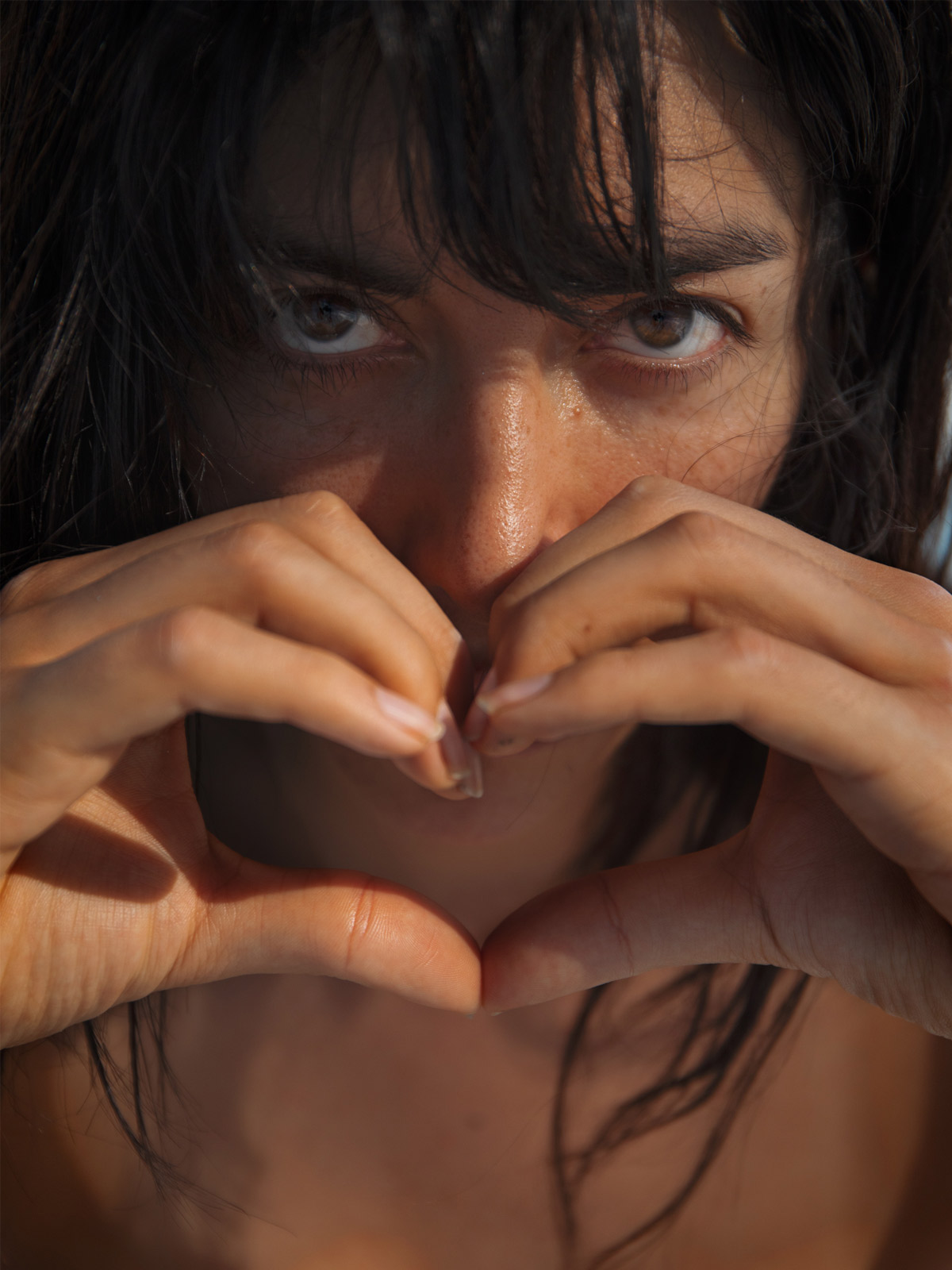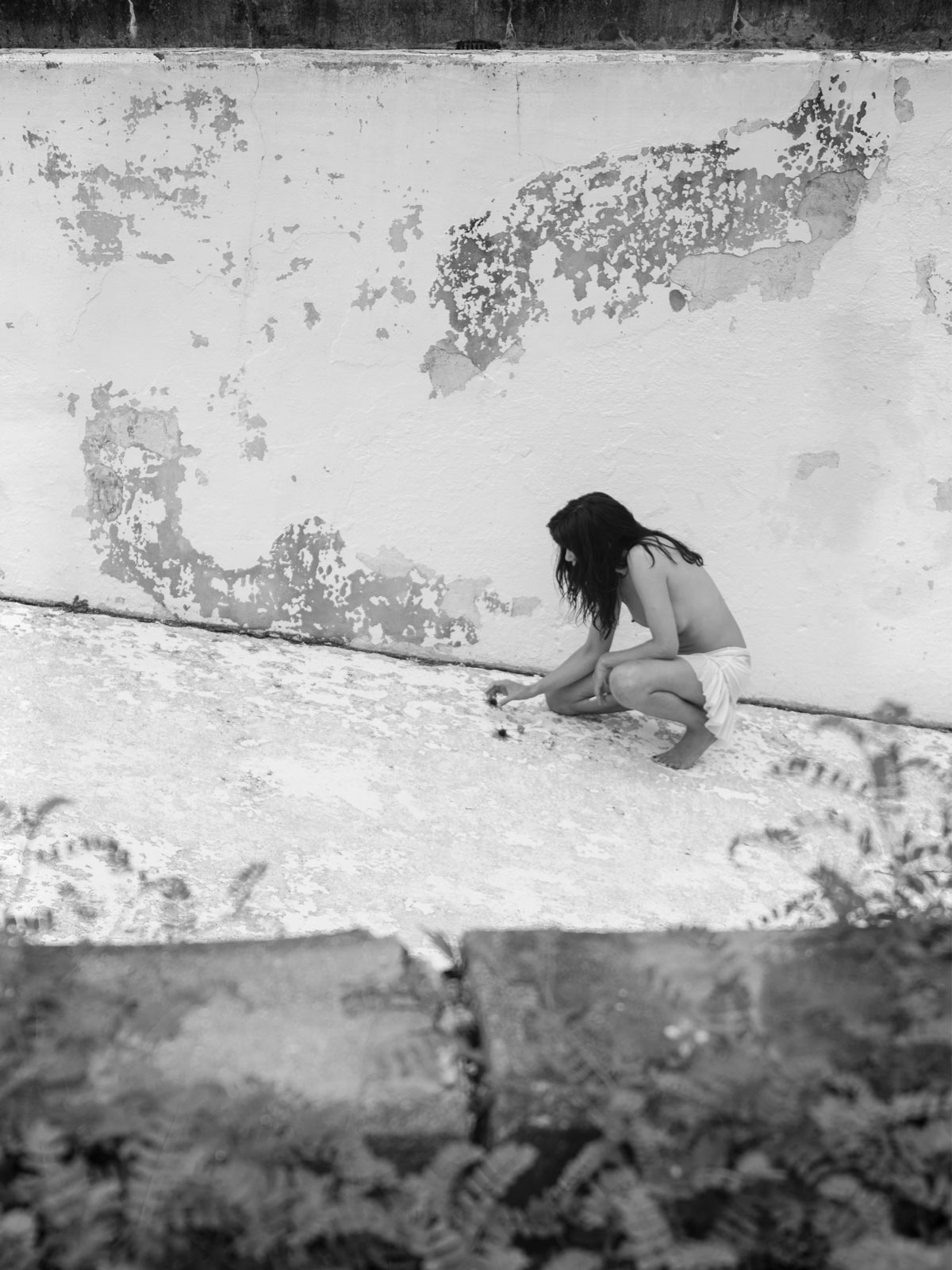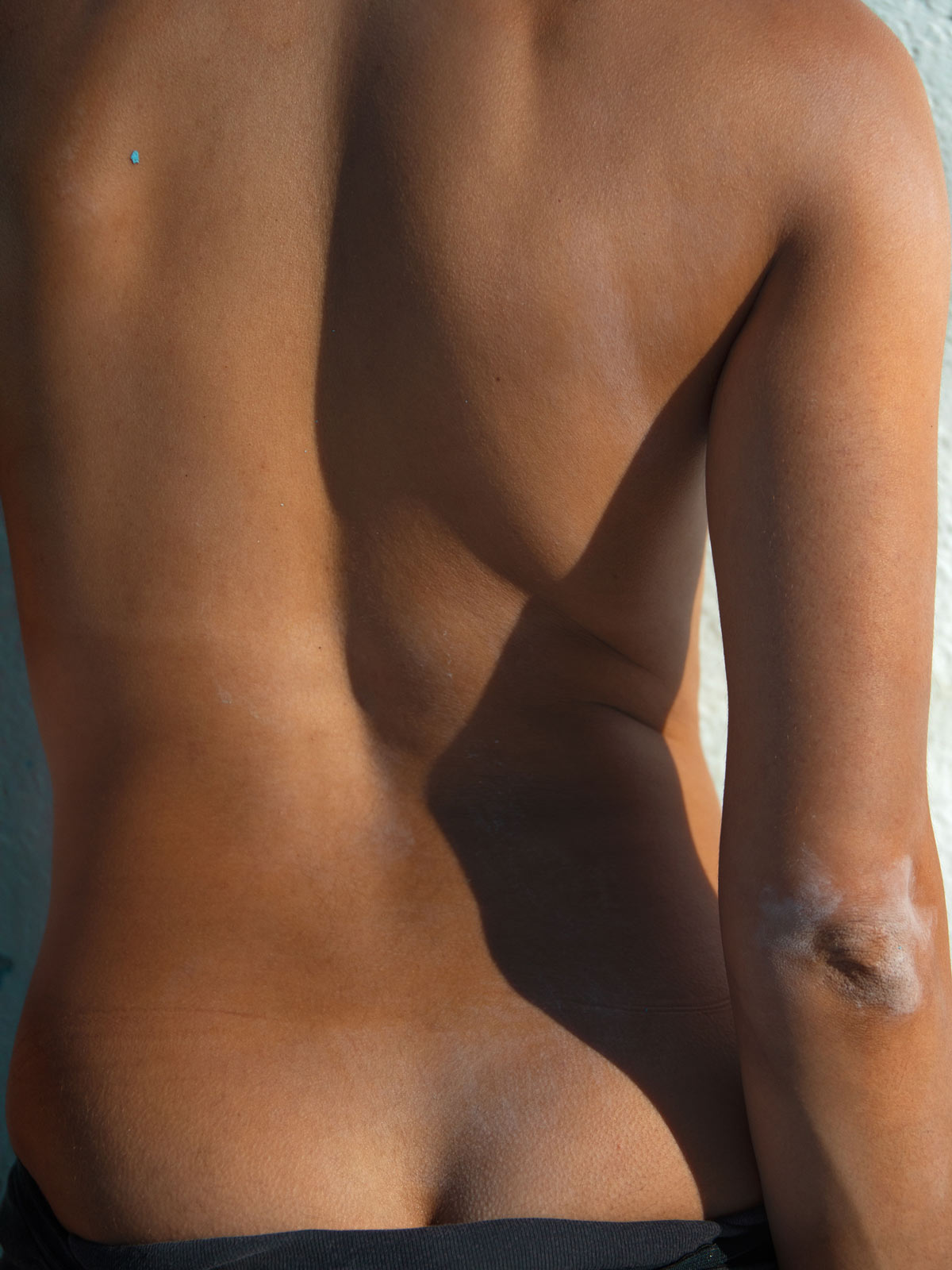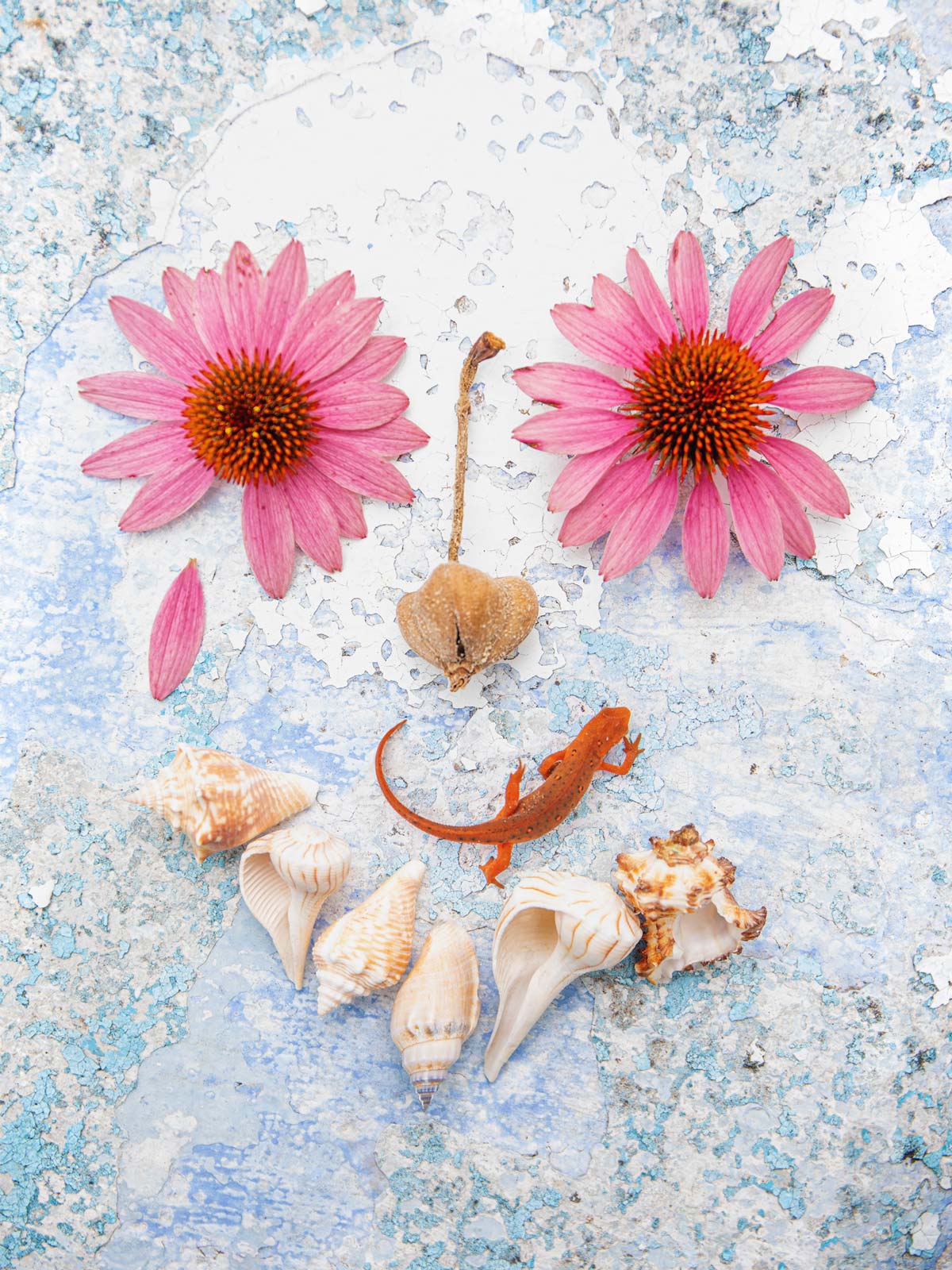
For Document’s Fall/Winter 2023 issue, the artist shares ‘Child Interrupted,’ a portfolio positioning the self as invention
For her show ANTI-ICON: APOKALYPSIS, Martine Gutierrez photographed herself as Aphrodite, Joan of Arc, the archangel Gabriel, Lady Godiva, La Madonna, Hua Mulan, Judith the Slayer. For #MARTINEJEANS, she starred as the face of a fictional denim campaign—an under-the-radar supermodel, plastered on a billboard and hoisted five stories up over 37th Street and Ninth Avenue. HIT MOVIE: Vol. 1 riffed on the Jean-Luc Godard quote: “All you need for a movie is a girl and a gun.” The artist obliged, wielding pairs of pistols and a machine gun, twisting through the air rocked by explosions in the distance, in heels, in dresses, in a trench coat thrown over a bra and underwear. On the museum’s wall, she attributed a new quip to herself: “Whether or not she’s born with one, give a girl a gun and you’ve got a hit movie.”
Gutierrez’s practice is dotted with romantic assumptions of seminal characters. More often than not, she’s channeling that lusted-after woman who holds a complicated spot in history, be it recent, ancient, legendary, or somewhere in between. Her artwork spans video and still image, installation and performance art, music, magazine, and mainstream acting: hyperbolizing femininity, stardom, desire, and race, to put things broadly.
In truth, Gutierrez’s work is better witnessed than described; the written word doesn’t quite cut to its big, beating heart. She resists the labels that tail her—Latinx, Indigenous, trans, queer—trying for art that stands on its own, legible to the masses, personal but universal. “I don’t want to hold the mantle!” she insists. “I don’t want to speak for a demographic!” At the same time, “Narrative structures rely on archetypes. Otherwise, the story gets too confusing… That’s my childhood understanding of why everybody on the playground needed to know, Are you this, or are you that?”
Filmmaker Zackary Drucker knows the line that must be toed, pitting the paradigmatic against the three-dimensional subject. Self-narrativizing is inextricably linked to the documentarian’s process, most recently undertaken for The Stroll (on the trans sex workers who frequented a pre-gentrified Meatpacking District in the 1980s and ’90s, co-directed with Kristen Lovell) and Queenmaker (on early-aughts New York socialites and the gossip blogs that launched their fame). The former film was awarded Sundance’s Special Jury Award for Clarity of Vision, a quality that could be easily ascribed to any project of Drucker’s. “It’s such a noisy ecosystem,” she says on today’s platform-above-all creed, “that, truly, the question is, How do you cut through and find your way to the things that matter?”
The question of what matters is political, and, of course, cultural and social and idiosyncratic. To make a documentary is to record a history—to hold the bag, so to speak, containing legacies that don’t only belong to you. Drucker navigates this duty with grace, listening and mapping out with an always-open mind: “I’m a believer and a seeker, and I’m not a skeptic.” Curiosity is more than a means to an end; a film doesn’t have to offer a solution. “We don’t really know the big picture. And we won’t know until we’re dead.”
A week ahead of their sit-down, Drucker saw Gutierrez in Rotting in the Sun—Sebastián Silva’s pitch-black thriller-meets-meta-comedy, which follows an LA Instagram celebrity (Jordan Firstman, as himself) to a gay Mexican beach town, where he convinces the director to collaborate on an upcoming show; “Think of it like Curb Your Enthusiasm, but positive.” Gutierrez, like Firstman and Silva, endeavored to show up as her own worst caricature—a droll performance artist adjacent to the capital-F, capital-I Film Industry, simultaneously immune to and thriving on the hedonistic customs and rampant self-obsession of the worst of the cultural elite.
“It’s a mindfulness, to be self-critical of the avatar we’re pretending to be,” says Gutierrez—which, Drucker points out, is really the crux of the film. In a sense, Rotting in the Sun provides a structure where the pair’s practices converge—trading vehicles for meaning-making, fact against fiction. There’s a convergence between fantasy and real life, where Gutierrez ditches pure roleplay for the performance of a flattened-down self—leaning into her own archetype rather than trying on anybody else’s.
By comparison, documentary seems like it should be black-and-white—but it’s storytelling all the same, where creative choices weigh heavily on a project’s lasting import. “The writing,” says Drucker, “is where you hit a wall with any kind of multi-dimensional person.” As a filmmaker, her role has been to parse through egos, memories, half-truths, confessions, facts, and testimonials—cutting through the noise to get to the bottom of a thing. Gutierrez takes the pre-packaged, layering one complete woman over another until their completeness shatters, asserting her own multifacetedness in the repetition. Stacking, knocking down, building up again—they work in tandem to make art with its own momentum.
Here, Drucker and Gutierrez take inventory of what they’ll need for the revolution: a propensity for the spiritual, a sense of humor, and fresh vegetables from the communal garden.
Zackary Drucker: Where are you, Martine?
Martine Gutierrez: I… don’t know.
Zackary: In your body?
Martine: I think I would like to be in Los Angeles.
Zackary: We would be very lucky to have you.
Martine: Eventually! Everyone I’ve been talking to has been trying to get me to [come to] Hollywood.
Zackary: I mean, first off—I just saw you in Rotting in the Sun last week. So I’m assuming that’s just people trying to get you in front of a camera, because you were hilarious, and it was such a stunning performance. I laughed my ass off. I felt like you were improvising a lot of that, too.
Martine: We were working with the director Sebastián Silva. He’s so guerilla. Everything was shot in his house. I don’t think there were really permits to shoot in public spaces…
There was a script. [But] we’re all ourselves: Jordan is Jordan, Seb is Seb, I’m Martine. Seb would say, ‘I want you to be the worst version of yourself possible.’ It was kind of a story with no heroes. In a day and age in which everyone is so careful about being appropriate, here was an opportunity to be headless.
“In a day and age in which everyone is so careful about being appropriate, here was an opportunity to be headless.”
Zackary: I came of age at a time when I never felt the responsibility to be appropriate. Art should be irreverent, make people nervous. Scare the horses, so to speak. An era in which everything is recorded, documented, scrutinized is so stifling for creativity. How have you navigated that?
Martine: Well, we’re being recorded right now. [Laughs] So I have to.
Zackary: You don’t have to, girl.
Martine: You’re right. I don’t have to. I think it’s a choice to participate or not. But maybe it’s not so binary… It’s a mindfulness, to be self-critical of the avatar we’re pretending to be.
Zackary: Which is very much the substance of Rotting in the Sun.
Martine: I mean, in the film, I play a performance artist. The biggest hand I had in terms of my own autonomy was the performance itself. I told Seb, ‘I’ve always wanted to be a mermaid. I have this kinship with mermaid mythology. And in the performance, I would like to be one and sit above a giant water tank, with a baby.’ [Laughs] The audience, with this impending [invitation] to dunk me and the baby.
Zackary: You’re doing a great job of teasing this. Everybody out there is gonna want to watch.
Martine: When it actually happened, I was terrified. Outside of my inner reality, as an artist, I’ve taken on this kind of educator role. Maybe I didn’t have a choice, because my parents are very much bleeding hearts who did a lot of civic activism work. I used to kind of roll my eyes at it. And now I realize, I’m more like them than I ever expected to be. And I don’t want to do it! I don’t want to hold the mantle! I don’t want to speak for a demographic! I don’t think it serves anyone. My spirits have been really low. I used to feel that you’ll never be happy with society unless you’re happy with yourself. Then, once you’re happy with yourself, you realize that you’ll never be happy with society—because society isn’t happy for you.
Zackary: I feel you, so deeply. That’s the journey through life—and to not be depressed is to be oblivious. For those of us who are conscious, who are clear-eyed, who are thinking deeply about the human condition, it’s dark. We owe it to ourselves to find as much pleasure and joy as possible. And also, to not pretend it’s not there. You have to pace yourself and find outlets for the light.
It’s fascinating—I saw Rotting in the Sun at Outfest, and so many of the films were about the spiritual vacuousness of right now. People are inundated with new technology, and it’s devoid of the things that make us human. It’s a phenomenon that’s happened throughout civilization: New technology comes in, and people get so excited by it that they overdo it, and then they dial back. They return to the fundamental things that have always ordered societies. We seek out ancient tools of survival.
Martine: Period. I feel, more so than ever, the appeal of a cult lifestyle.
Zackary: Wait, occult with an ‘O,’ or the four-letter word cult? You’re gonna start a cult, girl?
Martine: [Laughs] I think it already started. But no, just [living by] an ideology that’s built around values. Because no one wants to work and die. And that’s kind of what adulthood feels like. You get your sex robot—because everyone’s an incel. Then you make more money to stay in the apartment you don’t want to live in, and you do your best to assimilate.
“For those of us who are conscious, who are clear-eyed, who are thinking deeply about the human condition, it’s dark. We owe it to ourselves to find as much pleasure and joy as possible.”
Zackary: One thing I love about your work: Humor is the great unifier. Integrating comedy into what you do is the most powerful tool—a way of breaking that monotony. You’ve done that very effectively and gracefully and hilariously. I hope to be alive to see you at 60 years old, to experience all the incredible work you have yet to make. If you didn’t exist, we would have to invent you.
Martine: I am an invention. What is it when you excite materials? Galvanize. We have galvanized the vessel, the spaceship that we’re roaming around in. It all feels so temporary. And it used to really feel like I had something to say. Maybe it’s just because everyone has their two cents out on some platform and we have to rummage through that.
Zackary: It’s important to not have an opinion about everything. It’s such a noisy ecosystem that, truly, the question is, How do you cut through and find your way to the things that matter?
Martine: Yeah. But also, what matters? Love, art, music. The things you need to have for the revolution.
Zackary: Even when art falls away, under the most dire circumstances, love and a belief in something bigger [are] the saving grace. You hear about that in various historical instances. The last surviving element of humanity is kindness to each other. There’s always stimulus, material. There’s always new things on your phone.
Martine: A new alien sighting. Especially in times of [direction-seeking]—looking for the compass to point somewhere—we go back to these mythologies, these epic stories, these idols.
Zackary: You see it happen in many ways. People return to astrology. They’re collecting crystals. There are ways in which the zeitgeist is reembracing traditions that offer guidance and structure. I come from Ashkenazi Jewish immigrants who came to the US before World War II. I feel so reinforced by my predecessors—by our predecessors—and I have sought that spiritual compass in so many ways. I’m a believer and a seeker, and I’m not a skeptic. [Laughs] I’m willing to go there, to be malleable, to continue growing, to have an imagination.
Judaism is a ritual-based religion. To practice Judaism is to light candles on Shabbat, to avoid technology for a day, to say the Mourner’s Kaddish when somebody dies. And the belief part is not subscribed. I mean, there’s no Hell in Judaism, and there’s not really Heaven, either. There’s no sin. There’s none of the guilt. But to just say these prayers—to just speak them and feel connected to millennia before me, [to the people] who said the same thing, and who survived and didn’t survive… I mean, when I look at my family tree, three generations died in 1942. That’s an ancient link to, like, How did these people survive in the mountains of Eastern Europe, on the outskirts of cities, managing their own peasant villages and being invaded and murdered throughout centuries? All of that is embedded in our DNA. Time is a continuum, and our noses are up against the wall in this particular moment. We don’t really know the big picture. And we won’t know until we’re dead.
Martine: Spirituality is maybe what’s missing. Not in my work, but in my life. Maybe that’s what ANTI-ICON is searching for. There’s so little that is celebrated or preserved that isn’t in that vein of tourism.
Zackary: There’s so much to discover, at the same time.
Martine: Yeah. Maybe it’s just about cultivation. Going back to the cult again. I’ll have to call it something else—a residency. If you ever want to come speak at my residency, we would love to have you. An unmarked van will pick you up. [You’ll] have room and board and great food from our garden. People in the town call it a commune.
Zackary: Where is this commune?
Martine: I’m not at liberty to say at this time.
Zackary: Just tell me where the pick-up spot is.
Martine: Do you remember Megabus? We would be right around where Megabus picks people up.
Zackary: I’ll be there.
What’s your biggest vision as a creative?
Martine: I’ve always wanted to be a Bond girl. My whole life. That was the archetype. Film was one of the few things I could do with my father that was, like, masculine guy-time. We’d watch action movies. His English wasn’t [strong]; he didn’t read subtitles fast enough to know what was going on. If there was too much dialogue, he kind of got lost. [But] action kept him awake. James Bond struck a nerve for both of us.
Zackary: But you’ve been a Bond girl in your work. You are a Bond girl—you’ve done it.
Martine: [I want] two hours of believable fight scenes. I would love to jump out of something moving.
Zackary: You want to be a stunt queen. That makes a lot of sense to me. Because you are a creator, an author. You’re a photographer. You’re masterminding your own representation, your own persona, your own iconography. I would love to see you as a Bond girl. But I also know you would feel limited, because no writer or director can capture the complexity of who you are. The writing is where you hit a wall with any kind of multi-dimensional person.
Martine: I also don’t need to be me. If I’ve learned anything about acting, you have to share a piece of you that’s authentic. But then so much is artifice. Narrative structures rely on archetypes. Otherwise, the story gets too confusing. As a viewer, you don’t know how to orient yourself. That’s why we meet people and we’re like, What gender are you? What orientation? What’s your genetic code? It’s too uncomfortable to approach someone and have all those things be a question. That’s my childhood understanding of why everybody on the playground needed to know, Are you this, or are you that?
Zackary: That’s what makes us so compelling to people. The things that make us targets in our youth are our greatest assets as we mature. And we’re rewriting the script every day.
Martine: We’re recasting every day.
Zackary: Who you are today, you wouldn’t have imagined 10 years ago, 15 years ago, 20 years ago—not in your wildest dreams. Can you imagine what you’ve done? The life you’ve lived? The future is always better and worse, simultaneously. It moves in both directions. If you can just err on the side of the light, the beauty, the love, the juiciness, the sexuality, the fun, the humor… We make those decisions at every moment. It’s the trans condition to say, Where do I fit in this world?
Martine: I think you’re gonna move into politics. There’s something very… diplomatic.
Zackary: [Laughs] Yeah, maybe in the future, weirdo trans artists are gonna be politicians. That would be unprecedented. People are always talking about unprecedented times. But we’re unprecedented people.


